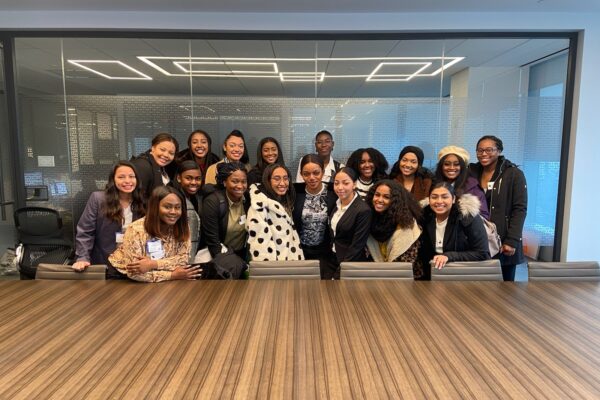Last March, as is tradition, young Black women and Latinas celebrated the end of the Fearless Leadership Institute Leadership Retreat by closing their eyes. Before them, a select few women from the group, recipients of recently announced awards, kept their eyes open and heeded the prompts read by the retreat facilitators.
“Go around and touch somebody who you feel is beautiful.”
With eyes shut, the women felt someone tap them in response.
“Touch somebody who has touched your life.”
“Touch somebody who made you laugh this weekend.”
After all the prompts were read, there was not a single dry eye in the room. Crying at the end of the emotion-filled ceremony is just as much tradition as the ceremony itself.
“It just makes every woman feel like they were recognized, they were seen, and they’re worthy — worthy of recognition, worthy of love, worthy just to be,” says Thaïs Bass-Moore, co-founder and director of the institute.
Bass-Moore and Tiffany Lewis, the group’s co-founder and the assistant vice president of the Longhorn Center for Academic Equity, have been working to advance young women professionally and personally — through annual retreats, weekly meetings, mentorship and study abroad opportunities — since 2013.
Black students make up 5.3% of the population at The University of Texas, as of fall 2020. Before the Fearless Leadership Institute existed, the Division of Diversity and Community Engagement (DDCE) had the African American Male Research Initiative (since renamed the Heman Sweatt Center for Black Males), but there was not a group specific to Black women.
“There were all these initiatives that were springing up for Black males and Latino males, and I was like, ‘What about the women?’” Lewis says. “In my opinion, if we’re trying to address the gaps in engagement, persistence and graduation, we should be focusing on entire groups and not segments of a group.”
Bass-Moore and Lewis wanted to create a space specifically for African American women because they knew what it was like to attend a predominantly white institution as a Black woman. Lewis earned all of her degrees at UT, and Bass-Moore attended the University of California, Los Angeles.
Fear will always be there, but if they’re prepared and we give them the tools they need, they will fear less.
When Bass-Moore first came to UT, she says she found that the students she was mentoring were dealing with the same issues she encountered at UCLA.
“A lot of them were doing well academically, but when it came to relationships and things outside of the academic world, they were struggling,” Bass-Moore says. “I was like, ‘Well, if you’re struggling in your personal realm, then it’s going to bleed over and spill into your academics, which was the case for me at UCLA.”
Although Lewis and Bass-Moore were forming similar ideas, they had yet to meet each other. Leonard Moore, now vice president of the DDCE and the George Littlefield Professor of American History, who is Bass-Moore’s husband, introduced them.
At the time, Lewis, who was doing coursework for her doctoral program, wanted to find ways to assist Black and brown women via professional development. She had been researching support for African American women on college campuses after seeing so many initiatives for Black and Latino boys and men. She sought to address the challenges Black women were facing — such as finding internships and dealing with stereotypes in the classroom — to help set them up for professional success. Meanwhile, Bass-Moore desired to create a program that helps women in their personal lives.
Eventually, Moore prompted Bass-Moore and Lewis to marry their ideas. The pair came up with the Fearless Leadership Institute as a holistic development program for African American women.
“We just wanted a really cool name,” Lewis says. “So, we say we want the girls to fear less. Fear will always be there, but if they’re prepared and we give them the tools they need, they will fear less.”
Later, Latinas at UT started attending institute events, so they were incorporated into the programming.
“Because our struggles sometimes are similar, (Latina students) just felt very comfortable with our conversation,” Bass-Moore says.
On Mondays, members gather for weekly interest group meetings; this fall, they’re being held on Zoom. With each new week comes a different topic, anything from relationships and spirituality to mock interviews and information about graduate school.
“Even if we don’t always discuss being Black or brown … just being able to come into a space, letting your hair down, and you don’t have to feel your skin color is enough on its own,” Bass-Moore says. “Just having a space that you know you can come to every week, get a hug, get some food, and just be yourself is doing the job.”
The group also offers a mentorship program, study abroad opportunities and the annual Leadership Retreat. In its first year, the retreat saw fewer than 30 women. Nowadays, attendance ranges between 100 and 125.
Last fall, the institute hosted the FLI High conference, during which 156 students from surrounding high schools were brought in for a full day of activities on campus, ending with a UT volleyball game.
Bass-Moore says there are plans to expand. A national conference for representatives from different universities to attend and learn how to start their own group was supposed to be held this year. However, with everything moved online because of the COVID-19 pandemic, Bass-Moore says she hopes to proceed in a different fashion.
By spring, the institute will record and produce its own podcast so people can listen wherever they are. And people from different universities can attend the now-virtual weekly meetings.
“There are so many women who I meet who are 30, 40, 50, 60 years old, who say, ‘I wish I had something like this when I was in school,’” Bass-Moore says. “That just reminds me that this needs to be more than at UT.”




